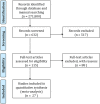Parental military deployment as risk factor for children's mental health: a meta-analytical review
- PMID: 31249614
- PMCID: PMC6587296
- DOI: 10.1186/s13034-019-0287-y
Parental military deployment as risk factor for children's mental health: a meta-analytical review
Abstract
There is evidence that military service increases the risk of psychosocial burden for not only service members but also their spouses and children. This meta-analysis aimed to systematically assess the association between military deployment of (at least one) parent and impact on children's mental health. For this meta-analytic review, publications were systematically searched and assessed for eligibility based on predefined inclusion criteria (studies between 2001 until 2017 involving children with at least one parent working in military services). Measurements were determined by total problem scores of the children as well as symptoms of anxiety/depression, hyperactivity/inattention, and aggressive behavior. Meta-analyses aggregated the effect sizes in random-effect models and were calculated separately for the relation between parental deployment and civilian/normative data and for the relation between parental deployment and non-deployment. Age of the children was used as moderator variable to explore any potential source of heterogeneity between studies. Parental military deployment was associated with problems in children and adolescents compared to civilian/normative samples. Significant effect sizes reached from small to moderate values; the largest effect sizes were found for overall problems and specifically for anxious/depressive symptoms and aggressive behavior. Within the military group, children of deployed parents showed more problem behavior than children of non-deployed parents, but effect sizes were small. Age of the children had no moderating effect. The results emphasize that children of military members, especially with a deployed parent, should be assessed for emotional and behavioral problems.
Keywords: Child mental health; Meta-analysis; Military deployment.
Conflict of interest statement
Competing interestsThe authors declare that they have no competing interests.
Figures
References
-
- Hoge CW, Auchterlonie JL, Milliken CS. Mental health problems, use of mental health services, and attrition from military service after returning from deployment to Iraq or Afghanistan. J Am Med Assoc. 2006;295(9):1023–1032. - PubMed
-
- Trautmann J, Alhusen J, Gross D. Impact of deployment on military families with young children: a systematic review. Nurs Outlook. 2015;63(6):656–679. - PubMed
-
- LaGrone DM. The military syndrome. Am J Psychiat. 1978;135(9):1040–1043. - PubMed
-
- Tanielian TL, Jaycox L. Invisible wounds of war: Psychological and cognitive injuries, their consequences, and services to assist recovery. Santa Monica: Rand Corporation; 2008.
Publication types
LinkOut - more resources
Full Text Sources


